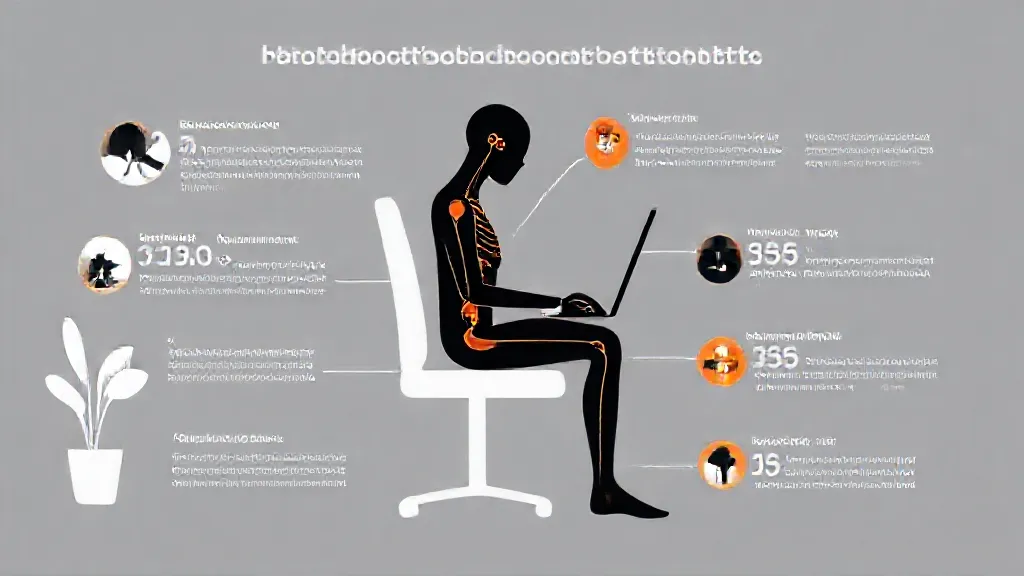Prolonged sitting has become a hallmark of modern life, particularly with the rise of desk jobs and sedentary lifestyles. Research indicates that sitting for extended periods can lead to a myriad of health issues, including obesity, cardiovascular disease, and even early mortality. Understanding the physiological and psychological impacts of sitting too long is essential for mitigating these risks and promoting a healthier lifestyle.
The Physiological Effects of Sitting
When we sit for long durations, our bodies undergo several physiological changes. One of the most significant impacts is on metabolism. Sitting reduces the rate of calorie burning, leading to weight gain.
Studies have shown that individuals who sit for more than eight hours a day are at a higher risk of becoming obese compared to those who are more active. Additionally, prolonged sitting can lead to insulin resistance, a precursor to type 2 diabetes, as the body's ability to regulate blood sugar diminishes.
Cardiovascular Risks Associated with Extended Sitting
The heart and circulatory system are also adversely affected by prolonged sitting.
When we sit, our blood circulation slows down, which can lead to increased blood pressure and higher cholesterol levels. Research has demonstrated that individuals who spend more time sitting have a higher risk of heart disease. A study published in the Journal of the American College of Cardiology found that those who sit for more than 11 hours a day have a 40% higher risk of dying from heart-related conditions.
Musculoskeletal Issues from Inactivity
Sitting for extended periods can also lead to musculoskeletal problems. Poor posture while sitting can cause strain on the spine, leading to chronic back pain and neck problems. Furthermore, sitting for too long can weaken the muscles in the legs and core, which are essential for maintaining proper posture and balance.
Over time, this can result in a cycle of discomfort and decreased physical activity.
Mental Health Implications of Sedentary Behavior
The mental health effects of prolonged sitting are increasingly being recognized. Sedentary behavior is associated with higher levels of anxiety and depression.
The lack of physical activity can lead to decreased endorphin levels, which are crucial for mood regulation. A study published in the journal Mental Health and Physical Activity found that individuals who engage in regular physical activity report lower levels of anxiety and depression compared to those who are sedentary.
Strategies to Combat the Effects of Sitting
To counteract the negative effects of prolonged sitting, it is essential to incorporate movement into daily routines.
Simple strategies include taking short breaks every hour to stand or walk, using a standing desk, or engaging in stretching exercises. Organizations and workplaces are increasingly recognizing the importance of movement, implementing policies that encourage employees to take breaks and promote active work environments.
The Importance of Regular Exercise
In addition to breaking up sitting time, regular exercise plays a crucial role in mitigating the health risks associated with prolonged sitting.
Engaging in at least 150 minutes of moderate-intensity aerobic activity each week, combined with strength training exercises, can significantly improve overall health and reduce the risk of chronic diseases. Exercise not only helps to counteract the effects of sitting but also boosts mood and enhances mental well-being.
Long-Term Consequences of Ignoring Sitting Risks
Ignoring the risks associated with prolonged sitting can have long-term consequences.
Chronic conditions such as obesity, diabetes, and heart disease can develop over time, significantly impacting quality of life. Additionally, the psychological effects of a sedentary lifestyle can lead to a cycle of inactivity that is difficult to break. It is crucial to be proactive in addressing these risks to maintain health and well-being.
Conclusion: Taking Action Against Sedentary Lifestyles
In conclusion, the implications of sitting too long extend far beyond mere discomfort. The health risks associated with prolonged sitting are significant and multifaceted, affecting physical and mental well-being. By understanding these risks and implementing strategies to reduce sitting time, individuals can take proactive steps toward a healthier lifestyle.
Embracing movement and prioritizing physical activity can lead to a healthier, happier life.
